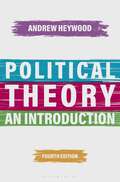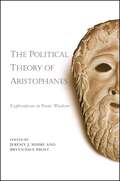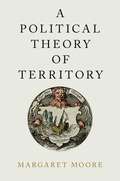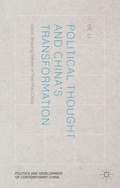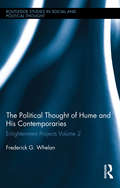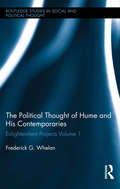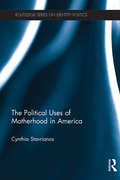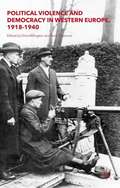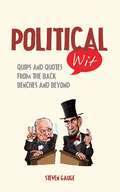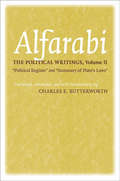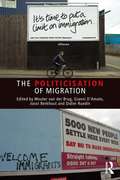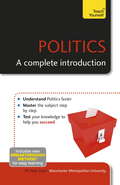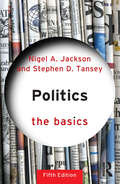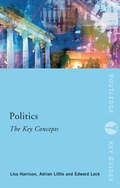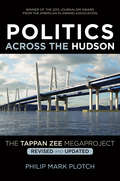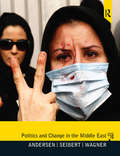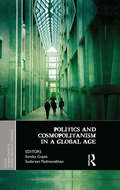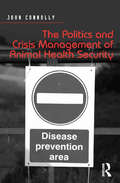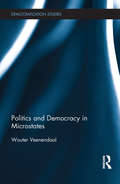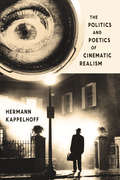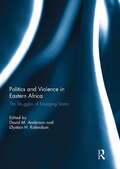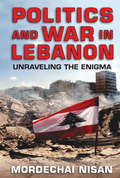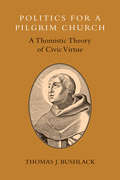- Table View
- List View
Political Theory An Introduction: An Introduction
by Andrew HeywoodThis is fully revised and updated fourth edition of a highly successful text in its field examines the key traditions in political thought whilst relating them to the contemporary world.Each chapter disscusses a cluster of interrelated terms and concepts.
The Political Theory of Aristophanes: Explorations in Poetic Wisdom
by Jeremy J. Mhire; Bryan-Paul FrostThis original and wide-ranging collection of essays offers, for the first time, a comprehensive examination of the political dimensions of that madcap comic poet Aristophanes. Rejecting the claim that Aristophanes is little more than a mere comedian, the contributors to this fascinating volume demonstrate that Aristophanes deserves to be placed in the ranks of the greatest Greek political thinkers. As these essays reveal, all of Aristophanes' plays treat issues of fundamental political importance, from war and peace, poverty and wealth, the relation between the sexes, demagoguery and democracy to the role of philosophy and poetry in political society. Accessible to students as well as scholars, The Political Theory of Aristophanes can be utilized easily in the classroom, but at the same time serve as a valuable source for those conducting more advanced research. Whether the field is political philosophy, classical studies, history, or literary criticism, this work will make it necessary to reconceptualize how we understand this great Athenian poet and force us to recognize the political ramifications and underpinnings of his uproarious comedies.
A Political Theory of Territory
by Margaret MooreThe author presents us with a systematic theory of territory and surveys and critiques all the relevant philosophical literature on territory.
Political Thought and China�s Transformation
by He LiSince the late 1970s China has undergone a great transformation, during which time the country has witnessed an outpouring of competing schools of thought. This book analyzes the major schools of political thought redefining China's transformation and the role Chinese thinkers are playing in the post-Mao era.
Political Thought of Hume and his Contemporaries: Enlightenment Projects Vol. 2 (Routledge Studies in Social and Political Thought)
by Frederick G. WhelanIntended for scholars in the fields of political theory, and the history of political thought, this two-volume examines David Hume's Political Thought (1711-1776) and that of his contemporaries, including Smith, Blackstone, Burke and Robertson. This book is unified by its temporal focus on the middle and later decades of the eighteenth century and hence on what is usually taken to be the core period of the Enlightenment, a somewhat problematic term. Covering topics such as property, contract and resistance theory, religious establishments, the law of nations, the balance of power, demography, and the role of unintended consequences in social life, Frederick G. Whelan convincingly conveys the diversity--and creativity--of the intellectual engagements of even a limited set of Enlightenment thinkers in contrast to dismissive attitudes, in some quarters, toward the Enlightenment and its supposed unitary project. Political Thought of Hume and his Contemporaries: Enlightenment Projects Vol. 2 contains six in-depth studies of eighteenth-century political thought, including both normative issues and examples of Enlightenment social science, including international relations and law, the problem of double standards, political economy, demography, and the causes of imperial decline. The central figure is David Hume, with substantial attention to William Robertson, Adam Smith, Montesquieu, Malthus, and others.
Political Thought of Hume and his Contemporaries: Enlightenment Projects Vol. 1 (Routledge Studies in Social and Political Thought)
by Frederick G. WhelanIntended for scholars in the fields of political theory, and the history of political thought, this two-volume examines David Hume's Political Thought (1711-1776) and that of his contemporaries, including Smith, Blackstone, Burke and Robertson. This book is unified by its temporal focus on the middle and later decades of the eighteenth century and hence on what is usually taken to be the core period of the Enlightenment, a somewhat problematic term. Covering topics such as property, contract and resistance theory, religious establishments, the law of nations, the balance of power, demography, and the role of unintended consequences in social life, Frederick G. Whelan convincingly conveys the diversity--and creativity--of the intellectual engagements of even a limited set of Enlightenment thinkers in contrast to dismissive attitudes, in some quarters, toward the Enlightenment and its supposed unitary project. Political Thought of Hume and his Contemporaries: Enlightenment Projects Vol. 1 contains six in-depth studies of issues in eighteenth-century political thought, with an emphasis on topics in normative theory such as property rights, the social contract, resistance to oppressive government, and religious liberty. The central figure is David Hume, with substantial attention to Edmund Burke, Adam Smith, and others in the period. The introduction situates the studies in the Enlightenment and considers interpretations of that movement.
The Political Uses of Motherhood in America (Routledge Series on Identity Politics)
by Cynthia StavrianosAs various contemporary groups use the language of motherhood to advance their political causes, maternal rhetoric has become very visible in the American political discourse of late. Yet while it has long been recognized that women have invoked their political status as mothers to organize and authorize their political action in the past, scholars have only just begun to examine the recent reemergence of this frame. This book describes the wide variety of political causes that mothers are organizing to address, and analyses whether ideologically conservative organizations are disproportionately represented among groups using motherhood to mobilize women. Stavrianos examines the use of maternal discourses in closer detail through a comparative case study of five groups using motherhood as their primary frame for collective political action: Mothers Against Drunk Driving, Million Mom March, Mothers Against Illegal Aliens, Mainstreet Moms Organize or Bust, and Mothers in Charge. Scholars interested in women and politics, interest group politics, social movements, political behavior, women’s studies, motherhood studies, and framing strategies will find this book noteworthy, as it adds to a growing body of literature exploring the use of motherhood as an emerging political frame, and to the interdisciplinary discussion of contemporary discourses of motherhood.
Political Violence and Democracy in Western Europe, 1918�1940
by Chris Millington Kevin PassmoreThe contributions in this collection explore manifestations of political violence in the democracies of interwar Europe. While research in this area usually focuses on the regimes that fell to fascism, Political Violence and Democracy in Western Europe, 1918-1940 demonstrates that violence remained a part of political competition in the democratic regimes of Western Europe too. Left-wing and right-wing ideas and uses of violence are examined in countries such as Britain, France, Belgium, the Netherlands, as well as in Italy and Germany. By assembling the latest research in the field it demonstrates that democracy does not necessarily provide an antidote to violent political conflict.
Political Wit: Quips and Quotes from the Back Benches and Beyond (Wit Ser.)
by Steven GaugeOrder, order! After a long day at the dispatch box, when your honourable friend’s white paper has made you feel green and your poll ratings have slumped to a new low, hunker down in Speakers’ Corner with this grand coalition of political quips and quotes – you’ll be ready to take on the opposition at any time!
The Political Writings, Volume II: "Political Regime" and "Summary of Plato's Laws"
by Charles E. Butterworth AlfarabiAlfarabi (ca. 870-950) founded the great tradition of Aristotelian/Platonic political philosophy in medieval Islamic and Arabic culture. In this second volume of political writings, Charles E. Butterworth presents translations of Alfarabi's Political Regime and Summary of Plato's "Laws" , accompanied by introductions that discuss the background for each work and explore its teaching. In addition, the texts are carefully annotated to aid the reader in following Alfarabi's argument. An Arabic-English/English-Arabic glossary allows interested readers to verify the way particular words are translated. Throughout, Butterworth's method is to translate consistently the same Arabic word by the same English word, rendering Alfarabi's style in an unusually faithful and yet approachable manner. Political Regime consists of two parts. One focuses on nature and natural existing things as well as the principles beyond nature that guide the existing things. In the second part, the exposition centers on human beings and their place in the larger cosmic whole as well as on how a proper organization of human life in political association provides the conditions whereby human beings might achieve their purpose. Summary of Plato's "Laws" gives an account of the first nine books of Plato's Laws. Alfarabi explains Plato's art of writing in general and the method he follows in writing the Laws in particular. Unlike Alfarabi's other works, which examine the place of legislation and laws in the broader context of political philosophy, the Summary is a more specialized study of the question of laws and how and why they are formulated, with a particular focus on the relevance of Plato's investigation concerning Greek divine laws for the study and understanding of all divine laws.
The Politicisation of Migration (Extremism and Democracy)
by Gianni D'Amato Wouter van der Brug Didier Ruedin Joost BerkhoutWhy are migration policies sometimes heavily contested and high on the political agenda? And why do they, at other moments and in other countries, hardly lead to much public debate? The entrance and settlement of migrants in Western Europe has prompted various political reactions. In some countries anti-immigration parties have gained substantial public support while in others migration policies have been hardly controversial. The Politicisation of Migration examines the differences between seven Western European countries by developing a conceptual framework to empirically explain patterns of politicisation and de-politicisation. The analyses show that over the past decade immigration has been increasingly defined in socio-cultural terms and that it has been receiving less political attention since the economic crisis started in 2007. This book also looks at the role of mainstream parties and political actors in the process of politicisation, and demonstrates how the role of ‘challengers’ is more limited than often assumed. Contributing to literatures on migration, party politics and agenda-setting, the book will be of interest to students and scholars in the fields of politics and migration studies.
Politics: Teach Yourself
by Peter JoyceWritten by Dr Peter Joyce, who is Principal Lecturer at Manchester Metropolitan University, Politics: A Complete Introduction is designed to give you everything you need to succeed, all in one place. It covers the key areas that students are expected to be confident in, outlining the basics in clear jargon-free English, and then providing added-value features like summaries of key books, and even lists of questions you might be asked in your seminar or exam. The book uses a structure that mirrors the way Politics is taught on many university courses. Chapters include key issues in studying politics, liberal democracy, political ideologies, elections and electoral systems, parties, pressure groups, the media, constitutions, the executive branch of government, bureaucracy, the legislative branch, the judiciary and law enforcement, sub-national government, and supra-national government and the role of the nation state in the modern world.
Politics: The Basics. Basics (The Basics)
by Nigel Jackson Stephen D TanseyNow in its fifth edition, Politics: The Basics explores the systems, movements and issues at the cutting edge of modern politics. A highly successful introduction to the world of politics, it offers clear and concise coverage of a range of issues and addresses fundamental questions such as: • Why does politics matter? • Why obey the state? • What are the key approaches to power? • How are political decisions made? • What are the current issues affecting governments worldwide? Accessible in style and topical in content, the fifth edition has been fully restructured to reflect core issues, systems and movements that are at the centre of modern politics and international relations. Assuming no prior knowledge in politics, it is ideal reading for anyone approaching the study of politics for the first time.
Politics: The Key Concepts (Routledge Key Guides)
by Lisa Harrison Adrian Little Ed LockPolitics: The Key Concepts is an up-to-date and broad-ranging introduction to the terms that lie at the heart of political discourse. Entries are drawn from areas such as political theory, international politics, political science and methodology. As well as explaining core, established principles, this informative guide explores some of the more complex, topical and contested concepts from the world of politics. Concepts covered include: Capitalism Class Identity Institutionalism Referendum Marxism Pluralism Postmodernism Socialism Social Constructivism In an accessible A-Z format with helpful cross-referencing and suggestions for further reading, Politics: The Key Concepts is an invaluable reference for all students of politics, international relations and related courses.
Politics Across the Hudson: The Tappan Zee Megaproject (Rivergate Regionals Collection)
by Philip Mark PlotchWinner of the 2015 American Planning Association New York Metro Chapter Journalism Award The State of New York is now building one of the world’s longest, widest, and most expensive bridges—the new Tappan Zee Bridge—stretching more than three miles across the Hudson River, approximately thirteen miles north of New York City. In Politics Across the Hudson, urban planner Philip Plotch offers a behind-the-scenes look at three decades of contentious planning and politics centered around this bridge, recently renamed for Governor Mario M. Cuomo, the state's governor from 1983 to 1994. He reveals valuable lessons for those trying to tackle complex public policies while also confirming our worst fears about government dysfunction. Drawing on his extensive experience planning megaprojects, interviews with more than a hundred key figures—including governors, agency heads, engineers, civic advocates, and business leaders—and extraordinary access to internal government records, Plotch tells a compelling story of high-stakes battles between powerful players in the public, private, and civic sectors. He reveals how state officials abandoned viable options, squandered hundreds of millions of dollars, forfeited more than three billion dollars in federal funds, and missed out on important opportunities. Faced with the public’s unrealistic expectations, no one could identify a practical solution to a vexing problem, a dilemma that led three governors to study various alternatives rather than disappoint key constituencies. This revised and updated edition includes a new epilogue and more photographs, and continues where Robert Caro’s The Power Broker left off and illuminates the power struggles involved in building New York’s first major new bridge since the Robert Moses era. Plotch describes how one governor, Andrew Cuomo, shrewdly overcame the seemingly insurmountable obstacles of onerous environmental regulations, vehement community opposition, insufficient funding, interagency battles, and overly optimistic expectations...
Politics and Change in the Middle East: New International Edition
by Roy R. Anderson Robert Seibert Jon G WagnerA longtime bestseller, Politics and Change in the Middle East employs a multidisciplinary approach to comprehensively and evenhandedly study the region’s past, present, and future. Through politics, economics, culture, and history, this text offers a rugged analytical framework that familiarizes students with the Middle East and helps them to critically evaluate contemporary developments. Thematically organized, Politics and Change in the Middle East introduces students to the primary actors and issues that define the region and its role in world politics.
Politics and Cosmopolitanism in a Global Age (Ethics, Human Rights and Global Political Thought)
by Sonika Gupta Sudarsan PadmanabhanThis book offers a unique reconceptualization of cosmopolitanism. It examines several themes that inform politics in a globalized era, including global governance, international law, citizenship, constitutionalism, community, domesticity, territory, sovereignty, and nationalism. The volume explores the specific philosophical and institutional challenges in constructing a cosmopolitan political community beyond the nation state. It reorients and decolonizes the boundaries of ‘cosmopolitanism’ and questions the contemporary discourse to posit inclusive alternatives. Presenting rich and diverse perspectives from across the world, the volume will interest scholars and students of politics and international relations, political theory, public policy, ethics, and philosophy.
The Politics and Crisis Management of Animal Health Security
by John ConnollyThe Politics and Crisis Management of Animal Health Security addresses the 2001 foot and mouth epidemic in the United Kingdom - one of, if not the, most significant crises ever to face the UK farming industry. Underpinned by interviews with politicians and bureaucrats and with significant primary documentary analysis the book shows that the crisis was a critical juncture in how disease outbreaks have been planned and managed ever since. The author explores how this event affected policy and governance arrangements for managing subsequent disease-induced threats (such as avian influenza and bovine TB) and concludes by considering the ’temporality’ of lesson learning by the UK government including the current and future challenges associated with managing incongruent risks (e.g., flood protection, swine flu and Ebola). This book provides students of public policy and administration with a significant illustration of how key concepts and analytical lenses from public policy can be applied to the study of the contours of practical policy change.
Politics and Democracy in Microstates (Democratization and Autocratization Studies)
by Wouter VeenendaalWhy are small states statistically more likely to have a democratic political system? By addressing this question from a qualitative and comparative methodological angle, this book analyses the effects of a small population size on political competition and participation. By comparing the four microstates of San Marino (Europe), St. Kitts and Nevis (Caribbean), Seychelles (Africa), and Palau (Oceania), it provides fresh and stimulating insight, concluding that the political dynamics of microstates are not as democratic as commonly believed. Instead, it is found in all four cases that smallness results in personalistic politics, dominance of the political executive, patron-client relations between citizens and politicians, and the circumvention of formal political institutions. In addition, the book suggests that the study of formal institutions provides an incomplete image of microstate democracy and that informal characteristics of politics in microstates also need to be explored in order to better explain the influence of smallness on democracy. This book will be of key interest to scholars and students of democracy, democratization, regional and decentralization studies and comparative politics.
The Politics and Poetics of Cinematic Realism (Columbia Themes in Philosophy, Social Criticism, and the Arts)
by Hermann KappelhoffHermann Kappelhoff casts the evolution of cinema as an ongoing struggle to relate audiences to their historical moment. Appreciating cinema's unique ability to bind concrete living conditions to individual experience (which existing political institutions cannot), he reads films by Sergei Eisenstein and Pedro Almodóvar, by the New Objectivity and the New Hollywood, to demonstrate how cinema situates spectators within society. Kappelhoff applies the Deleuzean practice of "thinking in images" to his analysis of films and incorporates the approaches of Jacques Rancière and Richard Rorty, who see politics in the permanent reconfiguration of poetic forms. This enables him to conceptualize film as a medium that continually renews the audiovisual spaces and temporalities through which audiences confront reality. Revitalizing the reading of films by Visconti, Fassbinder, Kubrick, Friedkin, and others, Kappelhoff affirms cinema's historical significance while discovering its engagement with politics as a realm of experience.
Politics and the Sacred
by Harald WydraThis path-breaking book argues that practices of the sacred are constitutive of modern secular politics. Following a tradition of enquiry in anthropology and political theory, it examines how limit situations shape the political imagination and collective identity. As an experiential and cultural fact, the sacred emerges within, and simultaneously transcends, transgressive dynamics such as revolutions, wars or globalisation. Rather than conceive the sacred as a religious doctrine or a metaphysical belief, Wydra examines its adaptive functions as origins, truths and order which are historically contingent across time and transformative of political aspirations. He suggests that the brokenness of political reality is a permanent condition of humanity, which will continue to produce quests for the sacred, and transcendental political frames. Working in the spirit of the genealogical mode of enquiry, this book examines the secular sources of political theologies, the democratic sacred, the communist imagination, European political identity, the sources of human rights and the relationship of victimhood to new wars.
Politics and Violence in Eastern Africa: The Struggles of Emerging States
by David M. Anderson and Øystein H. RolandsenOver the fifty years between 1940 and 1990, the countries of eastern Africa were embroiled in a range of debilitating and destructive conflicts, starting with the wars of independence, but then incorporating rebellion, secession and local insurrection as the Cold War replaced colonialism. The articles gathered here illustrate how significant, widespread, and dramatic this violence was. In these years, violence was used as a principal instrument in the creation and consolidation of the authority of the state; and it was also regularly and readily utilised by those who wished to challenge state authority through insurrection and secession. Why was it that eastern Africa should have experienced such extensive and intensive violence in the fifty years before 1990? Was this resort to violence a consequence of imperial rule, the legacy of oppressive colonial domination under a coercive and non-representative state system? Did essential contingencies such as the Cold War provoke and promote the use of violence? Or, was it a choice made by Africans themselves and their leaders, a product of their own agency? This book focuses on these turbulent decades, exploring the principal conflicts in six key countries – Kenya, Uganda, Sudan, Ethiopia, Somalia and Tanzania. This book was published as a special issue of the Journal of Eastern African Studies.
Politics and War in Lebanon: Unraveling the Enigma
by Mordechai NisanLebanon is an exceptionally misunderstood country; its religious politics are typically misrepresented and denigrated in Western political commentary. Politics and War in Lebanon offers a lucid examination of Lebanese society and politics. Mordechai Nisan examines Lebanon in its own termson its own cultural turf. He then points to the causes of political disintegration in 1975 and explores the capacity of Lebanon to recover and retain its unique national poise.Avoiding disorienting Western stereotypes, Nisan presents Lebanon in its own native frame of reference, as a multi-ethnic country that operates according to its immutable and enigmatic political forms. Lebanon is different from other Arab countries, as demonstrated through its very complex electoral system, its tradition of cross-elite cooperation, and its special sense of Lebanese national identity that differentiates it from its overbearing Syrian neighbor.Nisan explores intra-Maronite Christian feuds, identifies Syria's occupation strategy, analyzes the violence of the Palestinians, and studies Israel's failed policy strategy and the role of Hezbollah in the Lebanese power equation. Lebanon is caught between its special historical identity as a country ofpoise, creativity, and liberty and the interminable warfare in the streets and villages of the country. Although its future appears dim, its resilience enabled it to prevail in the past, and may yet continue to do so.
Politics: A Complete Introduction: Teach Yourself
by Peter JoyceThis is your go-to guide to politicsAs the UK gears up for a snap general election on the back of a hotly contested and divisive referendum, there has never been a better time to discover more about politics and how it works. Politics: A Complete Introduction explains everything you need to know, giving you a comprehensive and easy-to-understand introduction to a complex subject. Inside you will learn about different political ideologies and systems, referendums, elections and electoral systems, political parties and party systems, protest, the media and politics, constitutions and human rights, what the courts do, and how the machinery of government is organised. It also covers the nation state in the modern world and international terrorism. Politics: A Complete Introduction is a jargon-free guide that will get you informed, fast.
Politics for a Pilgrim Church: A Thomistic Theory of Civic Virtue
by Thomas J. BushlackPresents an innovative, constructive alternative to Christian involvement in the "culture wars" Church leaders and scholars have long wrestled with what should provide a guiding vision for Christian engagement in culture and politics. In this book Thomas Bushlack argues that a retrieval of Thomas Aquinas's understanding of civic virtue provides important resources for guiding this engagement today. Bushlack suggests that Aquinas's vision of the pilgrim church provides a fitting model for seeking the earthly common good of the political community, and he notes the features of a Thomistic account of justice and civic virtue that remain particularly salient for the twenty-first century. The book concludes with suggestions for cultivating a Christian rhetoric of the common good as an alternative to the predominant forms of discourse fostered within the culture wars that have been so divisive.
